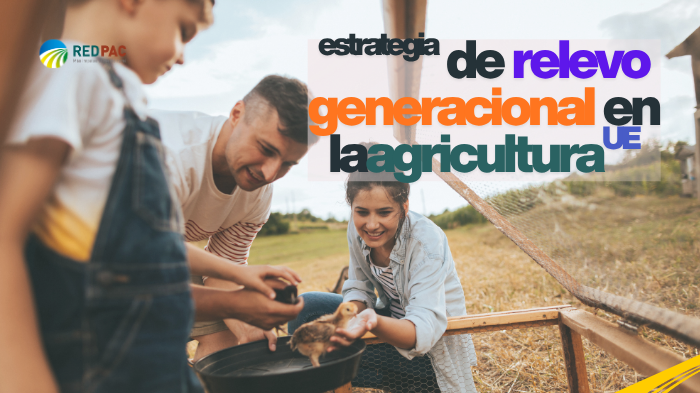
05 de November de 2025
Dinamización rural
Resiliencia y competitividad
The European Commission is promoting the “Generational renewal strategy in agriculture”: a comprehensive strategy to facilitate young people's access to the agricultural sector
The European Commission is promoting the “Generational renewal strategy in agriculture”: a comprehensive strategy to facilitate young people's access to the agricultural sector
The Strategy is structured around five pillars and aims to double the number of young farmers in the EU by 2040 so that they represent 24% of all European farmers
Today, generational renewal in the agricultural sector is synonymous with future food security. Nothing more, nothing less. Put simply, generational renewal is no longer an option in Europe: it is a strategic imperative. With an average age of 57 among European farmers and only 12% under 40, the European Commission (EC) launched the Strategy for Generational Renewal in Agriculture at the end of October , an ambitious roadmap to ensure that European agriculture remains stable, competitive, and vibrant. This initiative aims to facilitate young people entering, remaining in, and thriving within the agricultural sector through concrete measures, increased funding, and structural reforms.
The barriers are well known;
Difficulty in accessing land
Also, limitations in access to credit
Lack of business training
Shortage of services in rural areas
Complexity in business succession
Thus, the Strategy has been conceived in an integrated manner: it is based on the current reforms of the Common Agricultural Policy (CAP) and the CAP 2028-2034 proposal, connecting with the new National and Regional Partnership Plans .
A strategy with 5 pillars
The five pillars of the Generational Renewal Strategy in Agriculture focus on different aspects where action can have the greatest impact:
1. Start-up or beginnings
National starter pack for young farmers: funding, training and advice.
Aid for installation and subsidies to modernize farms.
Financial instruments and loans backed by the European Investment Bank ( EIB ) .
European co-financing of up to 85% to reduce the national burden.
Favorable legislation to facilitate establishment and succession.
Viable advice: support in mentoring and resilient business planning.
At least 6% of agricultural spending should be reserved in future national plans for generational renewal.
2. Access to the property
Access to land and the succession of farms would be addressed as follows:
National policies to prevent speculation and facilitate access to land.
Creation of the European Earth Observatory : transparency in use, ownership and pricing.
I support dignified retirement plans with financial security.
Priority in the transfer of public and municipal lands to young and new farmers.
Integration of succession, pensions and agrarian reforms into the European Semester , an annual exercise that coordinates the EU's economic and social policies.
3. Training
The challenges of the present require extensive interdisciplinary training:
Tailor-made training and lifelong learning through advisory services and AKIS , the "Knowledge and Innovation System in Agriculture" which centralizes knowledge flows between people, organizations and institutions that use and generate knowledge for use in agriculture and related fields.
Launch of an “Erasmus” program for young entrepreneurs in the agricultural sector.
Creation of the Women in Agriculture Platform for equality and mentoring.
Linking agricultural generational renewal programs with Horizon Europe and the European Competitiveness Fund ( ECF ).
Greater digital and financial training and access to innovation networks.
4. Rural development
To retain population in rural areas, the following is needed:
Investment in rural services: childcare, health, transport and broadband.
Business diversification : agritourism, bioeconomy and renewable energies.
Support services to help reconcile work, family and education.
Initiatives to be developed in the future as Ambassadors of Rural Youth to inspire and strengthen rural identity in each of their communities.
5. Community commitments
Long-term renewal requires a joint commitment at EU, national and regional levels:
Each Member State will develop a national and regional strategy as part of its Partnership Plan.
Identifying barriers, defining support measures and setting specific objectives.
EC supervision and recommendations within the framework of the CAP .
Use of the European Semester to strengthen land and pension reforms.
Periodic reports from Member States and adjustments according to common objectives.
And what about in Spain?
The 2023-2027 CAP includes specific aid for young farmers, including supplementary payments, start-up support, and preferential access to rural development measures. In Spain, the Ministry of Agriculture, Fisheries and Food ( MAPA ) promotes aid programs for young farmers, encourages agricultural training, and works to improve access to land and credit, in coordination with the autonomous communities.
Among the most noteworthy initiatives is the CULTIVA Program , which allows young farmers to undertake training placements on model farms throughout Spain, facilitating practical learning, the exchange of experiences, and direct contact with good agricultural practices. This measure, funded by the CAP, reinforces the national commitment to generational renewal and the professionalization of the sector.









